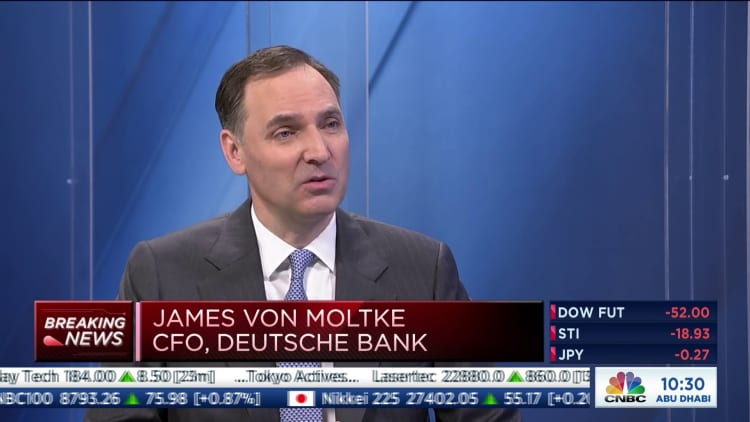
A general meeting of Deutsche Bank
Arne Dedert | picture alliance | Getty Images
Deutsche Bank shares slid Friday while the cost of insuring against its default spiked, as the German lender was engulfed by market panic about the stability of the European banking sector.
However, many analysts were left scratching their heads as to why the bank, which has posted 10 consecutive quarters of profit and boasts strong capital and solvency positions, had become the next target of a market seemingly in “seek and destroy” mode.
The emergency rescue of Credit Suisse by UBS, in the wake of the collapse of U.S.-based Silicon Valley Bank, has triggered contagion concern among investors, which was deepened by further monetary policy tightening from the U.S. Federal Reserve on Wednesday.
Central banks and regulators had hoped that the Credit Suisse rescue deal, brokered by Swiss authorities, would help calm investor jitters about the stability of Europe’s banks.
But the fall of the 167-year-old Swiss institution, and the upending of creditor hierarchy rules to wipe out 16 billion Swiss francs ($17.4 billion) of Credit Suisse’s additional tier-one (AT1) bonds, left the market unconvinced that the deal would be sufficient to contain the stresses in the sector.

Deutsche Bank underwent a multibillion euro restructure in recent years aimed at reducing costs and improving profitability. The lender recorded annual net income of 5 billion euros ($5.4 billion) in 2022, up 159% from the previous year.
Its CET1 ratio — a measure of bank solvency — came in at 13.4% at the end of 2022, while its liquidity coverage ratio was 142% and its net stable funding ratio stood at 119%. These figures would not indicate that there is any cause for concern about the bank’s solvency or liquidity position.
German Chancellor Olaf Scholz told a news conference in Brussels Friday that Deutsche Bank had “thoroughly reorganized and modernized its business model and is a very profitable bank,” adding that there is no basis to speculate about its future.
‘Just not very scary’
Some of the concerns around Deutsche Bank have centered on its U.S. commercial real estate exposures and substantial derivatives book.
However, research firm Autonomous, a subsidiary of AllianceBernstein, on Friday dismissed these concerns as both “well known” and “just not very scary,” pointing to the bank’s “robust capital and liquidity positions.”
“Our Underperform rating on the stock is simply driven by our view that there are more attractive equity stories elsewhere in the sector (i.e. relative value),” Autonomous strategists Stuart Graham and Leona Li said in a research note.
“We have no concerns about Deutsche’s viability or asset marks. To be crystal clear – Deutsche is NOT the next Credit Suisse.”
Unlike the stricken Swiss lender, they highlighted that Deutsche is “solidly profitable,” and Autonomous forecasts a return on tangible book value of 7.1% for 2023, rising to 8.5% by 2025.
‘Fresh and intense focus’ on liquidity
Credit Suisse’s collapse boiled down to a combination of three causes, according to JPMorgan. These were a “string of governance failures that had eroded confidence in management’s abilities,” a challenging market backdrop that hampered the bank’s restructuring plan, and the market’s “fresh and intense focus on liquidity risk” in the wake of the SVB collapse.
While the latter proved to be the final trigger, the Wall Street bank argued that the importance of the environment in which Credit Suisse was trying to overhaul its business model could not be understated, as illustrated by a comparison with Deutsche.
“The German bank had its own share of headline pressure and governance fumbles, and in our view had a far lower quality franchise to begin with, which while significantly less levered today, still commands a relatively elevated cost base and has relied on its FICC (fixed income, currencies and commodities) trading franchise for organic capital generation and credit re-rating,” JPMorgan strategists said in a note Friday.

“By comparison, although Credit Suisse clearly has shared the struggles of running a cost and capital intensive IB [investment bank], for the longest time it still had up its sleeve both a high-quality Asset and Wealth Management franchise, and a profitable Swiss Bank; all of which was well capitalised from both a RWA [risk-weighted asset] and Leverage exposure standpoint.”
They added that whatever the quality of the franchise, the events of recent months had proven that such institutions “rely entirely on trust.”
“Where Deutsche’s governance fumbles could not incrementally ‘cost’ the bank anything in franchise loss, Credit Suisse’s were immediately punished with investor outflows in the Wealth Management division, causing what should have been seen as the bank’s ‘crown jewel’ to themselves deepen the bank’s P&L losses,” they noted.
At the time of SVB’s collapse, Credit Suisse was already in the spotlight over its liquidity position and had suffered massive outflows in the fourth quarter of 2022 that had yet to reverse.

JPMorgan was unable to determine whether the unprecedented depositor outflows suffered by the Swiss bank had been amassed by themselves in light of SVB’s failure, or had been driven by a fear of those outflows and “lack of conviction in management’s assurances.”
“Indeed, if there is anything depositors might learn from the past few weeks, both in the U.S. and Europe, it is just how far regulators will always go to ensure depositors are protected,” the note said.
“Be that as it may, the lesson for investors (and indeed issuers) here is clear – ultimately, confidence is key, whether derived from the market backdrop as a whole (again recalling Deutsche Bank’s more successful re-rating), or from management’s ability to provide more transparency to otherwise opaque liquidity measures.”
—CNBC’s Michael Bloom contributed to this report.
